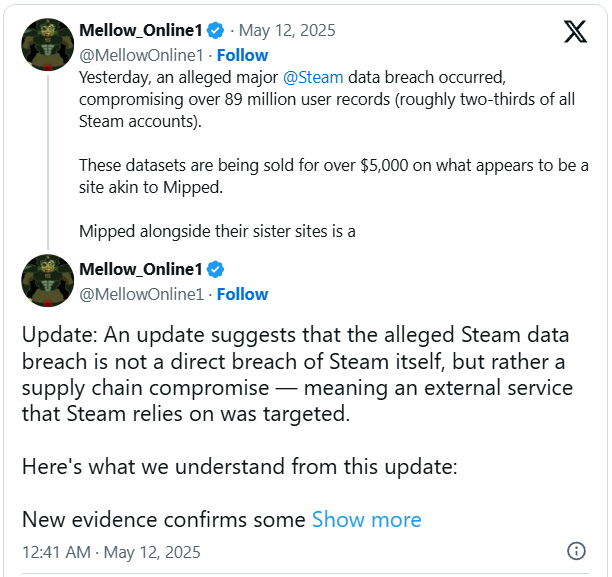Steam Data Breach: What Happened and How to Protect Your Account

The recent Steam data breach has sent shockwaves throughout the gaming community. Millions of users now worry about the safety of their accounts, with reports suggesting that over 89 million Steam accounts may be affected. If you rely on Steam for your gaming or personal data, understanding the situation and knowing how to respond is vital.
What Is the Steam Data Breach?
Reports emerged in May 2025 indicating that a hacker had obtained a massive trove of Steam user data. According to an article on Mashable, a threat actor using the alias "Machine1337" posted on a dark web forum, claiming to have breached Steam and obtained over 89 million user records. The stolen dataset was being offered for sale for $5,000. Although the exact method of the breach remains unclear, early evidence suggests a third-party vendor, not Steam itself, may be responsible.
Valve, Steam’s parent company, has not provided an official comment yet. Nonetheless, the scope of the breach has led to an urgent call for all users to secure their accounts as soon as possible.
How Did the Steam Data Leak Happen?
There is still uncertainty about the source of the data breach. Some experts initially suspected a vendor called Trillio, but Valve confirmed they do not use Trillio's services. Investigations later shifted focus toward possible supply-chain compromise, involving communications provider Twilio.
According to BleepingComputer, Twilio, which enables two-factor authentication (2FA) and SMS code delivery for many companies, has denied any breach of their systems. The leaked data included real SMS confirmation codes and phone numbers, but the exact source remains unidentified. Technical evidence suggests an intermediary SMS provider may have been involved. This remains under investigation, but, out of caution, users should assume their account information may be at risk.
Who Is Affected by the Steam Data Breach?
With Steam boasting over 120 million active monthly users, nearly two-thirds of accounts could be impacted. As highlighted by GAMINGbible, this breach is one of the largest incidents involving gamer data. Personal details, associated email addresses, and SMS-based 2FA codes are among the information potentially exposed.
Even if you have not detected suspicious activity on your account, it is still recommended to update your security settings. Threat actors may use the leaked information to attempt account takeovers or launch phishing scams targeting Steam users.
Steps to Secure Your Steam Account
Act now to minimize the fallout from the Steam data breach. Here are essential steps you should take:
- Change your Steam password. Select a strong, unique password you have not used elsewhere.
- Enable Two-Factor Authentication (2FA). Activate Steam Guard Mobile Authenticator for extra protection against unauthorized access.
- Monitor account activity. Check for emails or login attempts you do not recognize.
- Be cautious of phishing scams. Only trust password reset codes that you request yourself and be wary of unfamiliar emails or messages claiming to be from Steam.
- Review linked accounts. Double-check any connected email addresses and payment methods for suspicious transactions or access attempts.
Staying Informed and Vigilant
The gaming world is always a target for cybercriminals. Supply chain vulnerabilities, weak passwords, and unsecured third-party services can all lead to disasters like the Steam data breach. For more in-depth coverage, you can read reports from Mashable, BleepingComputer, and GAMINGbible.
Conclusion
The Steam data breach is a wake-up call for gamers everywhere. Even if you think your account is safe, adopting strong security habits today can protect your information for the future. Change your password, enable 2FA, and stay alert for suspicious emails. Protect your digital life—your games depend on it.